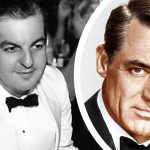John Wayne, the name synonymous with the wild west, and Hollywood royalty. Wayne, also nicknamed Duke, was an American actor, producer, and director who became a popular icon through his starring roles in Western films such as The Searchers and True Grit. His career spanned from the silent era of the 1920s, through the Golden Age of Hollywood and eventually American New Wave, appearing in a total of 179 film and television productions.
In 1999, the American Film Institute selected Wayne as one of the greatest male stars of classic American cinema. In 1976, John Wayne made his final screen performance, he played an aging gunfighter battling cancer in The Shootist. The film featured the young Ron Howard, known for his role in Happy Days and more recently his filmmaking career. With the tough as nails Wayne playing alongside the young and tender Howard, just what were his true feelings of the young star? Join us as we take a look at the surprisingly heartfelt relationship between these two greats from two very different generations of Hollywood.
John Wayne’s high praise of Ron Howard
John Wayne portrays tough and tough loners on screen, in real life he is a big softy at heart. Wayne loves his family, and this includes those that he unofficially adopted, the Happy Days actor Ron Howard. The two met during the production of the 1976 western, The Shootist. Howard played Gillom Rogers and left quite an impression on the legendary Hollywood star. John Wayne starred in the production as J.B. Books, a sheriff-turned-gunslinger.
Unfortunately, their real-life friendship blossomed at a time of declining health for Wayne. Because of this, their time knowing one another on a personal level was short-lived. Wayne offered much praise for the young star.
The rising star that made a strong impression
Ron Howard left a strong and positive impression on John Wayne. Wayne describes him as a young fella who he thinks is as good an actor as he ever works with. His description continued by labeling Howard as just wonderful. But their very first encounter wasn’t quite so ideal. When first seeing Howard, Wayne gave a witty response due to seeing the young actor holding a magazine that featured a spread for Happy Days. In classic John Wayne fashion, he dryly said, “a big shot, huh?”.
But Howard managed to get the Hollywood legend on his side by asking Wayne to read lines with him. This was a pleasant surprise for Wayne, as nobody ever asks him to read lines with them. This was enough to win Wayne over, while Howard didn’t need any excuse to like Wayne as he was already a huge fan. Howard explained that he always admired John Wayne as a movie star, but also thought of him as a total naturalist.
Respect mutually grew between the two actors, and Wayne gave possibly the highest praise any up and coming actor could ever hope for. Wayne explained that he’d have been proud to have Ron Howard as his son. He continued by saying that he’d be even prouder if he was Howard’s agent and that he was his brother.
If you’re enjoying this video, remember to hit that like button and subscribe to the channel for more entertaining content. Now stay with us for more details about the relationship between John Wayne and Ron Howard.
What John Wayne taught Ron Howard about manhood
Today, Ron Howard is mainly famous as one of Hollywood’s most prestigious film directors. With works such as Apollo 13, A Beautiful Mind, Frost/Nixon, Cinderella Man, The Da Vinci Code, and Solo: A Star Wars Story, it’s easy to see why. But Howard is also famous for another successful career in Hollywood, as an actor. Howard gets prominent roles in the sitcoms The Andy Griffith Show and Happy Days and is also well familiar with his role in George Lucas’ American Graffiti.
His appearance in The Shootist happened to be John Wayne’s final movie and around his one hundred and seventy fifth film. It also starred other Hollywood greats like James Stewart, Lauren Bacall, and John Carridine. With the cast of such Hollywood greats, it lends credence to Ron Howard’s appearance in the film as like a passing of the torch from one generation to the next.
Discussing whether working with Wayne and Stewart taught Ron Howard anything about manhood, Howard explained that John Wayne used a phrase for scenes that were going to be difficult. That phrase, which he later attributed to film director John Ford was, “This is a job of work”. Howard went on by explaining that if there was a common thread between Wayne, James Stewart, and Glenn Ford, it was their work ethic. Their work ethic is what drove them. To cheat the project was an insult. To cheat the audience was damnable.
Howard spoke about this subject again in a different interview. He explained that he has worked with Bette Davis, John Wayne, James Stewart, and Henry Fonda. Once again, the thing they all have in common was that even in their 70s, they worked a little harder than everyone else.
The final days of John Wayne
Sadly, John Wayne passed away three years after the impactful meeting between himself and Ron Howard. Wayne was undoubtedly the most popular and beloved movie star of his generation. But further than that, John Wayne has become an American icon who ranks up there at the top alongside George Washington, Abraham Lincoln and Davy Crockett.
With a life well lived, Wayne’s seventy-year-old body was quickly breaking down. The filming of The Shootist was very precarious, due to Wayne’s poor health. He was having so much trouble breathing that there was an oxygen tank available on the set for him to use. He suffered bad coughing spells and there were several days of shooting that he missed. This led to the use of a double in order to keep production moving.
Suffering great pain led to Wayne being moody, angry and sometimes hostile. It tells that one day during the shoot, Wayne blew up at the cameraman, accusing him of not filming correctly and not paying enough attention to the lighting. The director of the film, Don Siegel, angrily told Wayne to leave the cameraman alone. He then told Wayne to take a look at the dailies, the footage from the previous day. Wayne did as requested and watched the dailies. Needless to say, he was pleasantly surprised. Wayne then describes it as the best damn film of him he’s ever seaw, and asks for forgiveness.
Wayne’s high praise didn’t help The Shootist on its release. The movie was a massive flop that grossed less than $6 million domestically. While Wayne wasn’t broke, he was certainly in need of money. This led him to star in TV commercials which was something the legend had never done before. Wayne filmed commercials for an aspirin substitute, Datril, as well as Great Western Savings & Loan.
Bad investments on Wayne’s part had cost him a fortune. This left him bitter, knowing that he deserved to be much more well-off after all of his years spent in Hollywood. This wasn’t helped by his heart troubles. A lifetime of heavy smoking, drinking, and eating less than healthy foods were starting to take their toll on him. Wayne had to undergo a heart operation and had a pig’s valve put on his heart.
John Wayne made his final public appearance at the 1979 Academy Awards. He had actually gone through radiation treatments earlier that day, having been diagnosed with cancer. His weakened state was noticeable. Taking a short rehearsal, he then took a nap, feeling very sick and tired. Wayne then appeared that night and awarded the Best Picture Oscar to Coming Home, which starred Jane Fonda and Jon Voight. About a woman whose husband is fighting in Vietnam, who falls in love with another man who suffered a paralyzing combat injury there.
After leaving the stage, Wayne was greeted by his good friend, singer, actor, comedian, and member of The Rat Pack, Sammy Davis Jr.. Davis gave Wayne a big bear hug which he regretted later due to Wayne’s physically fragile state. Considering that Davis was 125lbs and worried about hugging John Wayne, goes to show how poorly Wayne’s health must have been. It’s even been revealed that Wayne was so frail-looking, that he beefed up his appearance by wearing a wet suit under his tuxedo.
It wasn’t long after this final appearance that Wayne collapsed to the floor in agony. His health rapidly deteriorated as the cancer spread. Wayne was put in hospital and absolutely hated it there. It is reported that Wayne broke down and cried sometimes while sitting in his painful confinement. With his health fading fast, family and friends visited to pay their respects. His last few days were spent in hospital, fading from unconsciousness to semi-consciousness. Surrounded by several family members, on June 11th, 1979, Wayne passed away.
While his daughter, Aissa, held his hand she asked him if he knew who she was. John Wayne’s response was his final words, “Of course I know who you are. You’re my girl. I love you.”
Does it surprise you that John Wayne spoke so highly of Ron Howard, or was Wayne always more gracious and kind hearted than the characters he played on screen?
Let us know in the comments section below and don’t forget to subscribe to Facts Verse for more. Click the bell icon to stay updated on all our latest content.


